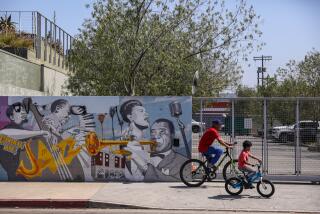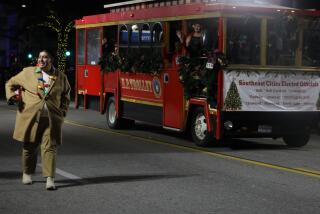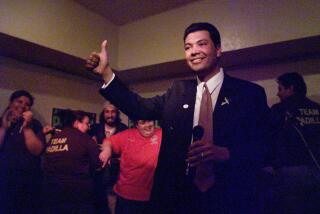Valley Interview : County-Bound Yaroslavsky Recalls Coming of Age in City Hall
Zev Yaroslavsky was elected county supervisor in June and in December will leave the Los Angeles City Council, where he has served since 1975.
Yaroslavsky discussed his two-decade career in an interview with Times political reporter John Schwada.
*
Question: Talk about the job at City Hall.
Answer: I’m going to miss City Hall. I don’t think there’s a more challenging job in politics than being a member of a local city council. A Los Angeles council member can be involved in every aspect of the city. To be elected to the governing body of the second-largest city in the United States at 26 years of age was mind-boggling. This wouldn’t have happened in Europe. In most parliamentary systems in the world, it’s not until you are 20 or 25 years into adulthood that you get that kind of opportunity.
Q: You’ve hobnobbed with the rich and famous, including President Nixon’s chief of staff, Bob Haldeman, who once called on you to ask for support in obtaining a building variance in Westwood for a client .
A: I said, “Bob, I don’t think we’ll have a problem with this, but I want one thing in return.” And his eyes lit up. “Well, what is it, councilman?” “I’d like to go out to lunch with you and spend two hours talking about Nixon.” That was the condition. And he said, “Oh, I’d be delighted.” So we met at the Marquis hotel in Westwood for lunch.
A very, very interesting guy. Totally different from the impression I had from reading about him. The variance was going to be fixed anyway. It was not a substantive variance, trust me.
Q: What were your first days in office like?
A: My colleagues were quite good to me. They treated me as an equal. There were people here who were old enough to be my grandfather or my parents. Some of my worst adversaries even gave me a lot of slack.
The first vote I cast was to cut off a debate, and I voted no. I thought we were voting on the substance of the issue. The vote was 14-1, and I was the one vote. I later got a copy of the roll call sheet as a souvenir.
A few months later, I got involved in the Robert F. Kennedy assassination investigation, and my first major legislative act was to put in a motion to establish an ad hoc committee to investigate how the assassination had been handled by the police.
It was very controversial, and I hustled to get the votes. Council President John Gibson then appointed the members to the committee, and he was kind enough to appoint me to it. But the four others were totally uncooperative. So it was a Pyrrhic victory, if you will. I learned a lot that summer.
Q: Whom will you miss most?
A: The person I really respected personally, not in a political sense but a personal one, was Ernie Bernardi. (Longtime Councilman Ernani Bernardi left office in 1993.) This was a man with a level of personal integrity that I aspired to.
I wrote him a note on his last day in office, saying something to the effect that I loved him like I loved my father. And I really meant it. He walked over to me afterward and said that in 32 years at City Hall, that was the nicest thing anyone had ever said to him. For all his craziness and his habit of pressing the “no” button, we’ve all come around to his way of thinking on many things.
Q: You made a last-minute decision not to challenge Mayor Tom Bradley’s bid for a fifth term in 1989. Subsequently, Bradley became enmeshed in a scandal about his personal finances and only narrowly escaped being thrown into a runoff election. Do you have any regrets about the decision?
A: No, I never regretted it. I don’t think anyone will ever understand why I pulled out until I sit them down and relate the chronology. I wasn’t going to do a kamikaze attack. I didn’t want out of government bad enough to put it all on the line in what I thought was a futile effort to unseat the mayor. Most people today look at what happened and for them the timing is blurred. Given what I knew on Jan. 8, or whatever it was, I made the right decision.
But I’ll tell you this, I have thought about what would have happened if I’d won and we had had the civil disturbance we had in 1992 and the Rodney King fiasco in 1991. It could’ve been a hellish existence.
Q: How was it possible for the city -- and its elected leadership -- to wake up one day and find itself with a Police Department that was seemingly out of control, abusive and racist?
A: I think it was a failure of all the elected and appointed people who had oversight over the Los Angeles Police Department, particularly the Police Commission.
I took on the Police Department. I took them on over the Public Disorder Intelligence Division and over police use of the chokehold, and I paid a price for it. The Police Protective League wouldn’t even endorse me in one election where I ran unopposed. And Daryl Gates vilified me publicly--at a time when he was popular. And all that sent a signal to every City Council member. I think all the people, the mayor, the Police Commission, said: “I don’t want to be in Yaroslavsky’s shoes.”
But I was fortunate because I had a district that backed me up. I didn’t represent Chatsworth or Tujunga. I had a district that was ready to back up a legitimate, aggressive look at the Police Department.
Q: Did Tom Bradley’s political history blind his Administration to police abuses?
A: Before Tom Bradley was elected in 1973, he had been defeated four years earlier by Sam Yorty. Most people will say that Tom Bradley’s loss in 1969 was due in large measure to Yorty’s successful attack, claiming that Tom Bradley was going to turn the Police Department upside down. I think Tom Bradley and Sam Williams (Bradley’s longtime Police Commission member) had the 1969 defeat seared into their psyches. And they did everything in their power to avoid a public confrontation between Tom Bradley and the police. Most politicians will not admit to this, but they cannot afford to do battle with their police departments. . . .
I’ve never said this before, but during the city’s recent contract dispute with the police I had three flat tires of my city car in my driveway. I can’t prove who did it. Alicia Katz, my deputy, had an industrial-sized thumbtack put sharp-end-up on the seat on her city car right in the middle of this thing. Fortunately, she saw it before she sat down. There was a lot of funny business going around.
I voted against the contract. I thought it was a bad deal, and I didn’t think the overall aura of intimidation should be rewarded--Jeff Garfield, the union’s representative, saying they were going to dig up dirt on the mayor and the council. That was extortion. That was a threat. In fact, the city attorney wrote a memo to the City Council saying that might have been a violation of the law.
Q: What’s it like to represent the 5th District, which encompasses Fairfax, Westwood, Bel-Air, Sherman Oaks and Van Nuys?
A: It is the most politically challenging district in the city. Everybody in my district reads excessively about mundane things like local government. Everybody is involved in a neighborhood and active in their neighborhood association. Golda Meir (the former Israeli prime minister) once said when she was asked what it was like to be the head of a nation of 4 million people: “I’m prime minister of 4 million prime ministers.” I’d have to say I’m councilman of 300,000 council members. Everybody thinks--and with some justification--that they can do the job as well as if not better than the incumbent.
Q: What have you liked least about the job?
A: The loss of privacy--for my family, principally, not so much for me. My daughter has told me--and she’ll probably kill me if she reads this--that sometimes she’d rather not be known as Zev Yaroslavsky’s daughter. And she shouldn’t be, and my wife should not be known as Zev Yaroslavsky’s wife. But actually there are very few downsides to this job.
Q: What did you think of Ed Davis, former police chief and former state senator from the San Fernando Valley?
A: Ed Davis and I have become good friends. In retrospect, when I have a chance to compare him with his successor, he was a pretty darned good chief of police. He never once threatened me or disrespected me in any way. I was a 26-year-old snot-nosed kid. I can see now how Davis would have been right in saying: “Who is this punk, just out of college, telling me, a police officer for 25 years, what to do?” But he didn’t. Now Daryl Gates did have that attitude.
Q: Do you have a favorite accomplishment?
A: For pure satisfaction, other than my first election, there was nothing to compare to the political satisfaction of winning Proposition O (a 1988 city ballot measure to bar Occidental Petroleum from drilling in Pacific Palisades). We were outspent $10 million to $3 million. We had a little help from an oil rig explosion in the North Sea that summer. After all this, (Occidental Chairman) Armand Hammer and I became buddies again.
Q: Armand Hammer was a fierce adversary of yours.
A: Proposition O was an absolute war with him. But a few months after the election and we had won, I got a call to meet with Armand Hammer to discuss his plans to build an art museum in Westwood. After a while, he said, “I want to talk to you alone.” He asked what my plans were. He said, “Anything you ever want to do, you can count on me as a friend and supporter. I really think you would’ve made a great mayor.”
I asked him, “Are you going to have a birthday party this year, Dr. Hammer?” And he said, ‘Yes, as a matter of fact.” And I said, “I’d like to come.” In his later years, he celebrated his birthdays with a big bash where he’d bring Mstislav Rostropovich, the cellist, to town, and he’d usually play Tchaikovsky’s Variations on a Rococo Theme and Dvorak’s cello concerto, two of my absolutely favorite pieces of music. I used to get invited to these bashes until I voted against his oil-drilling deal. Then I was off the list. So my wife and I went. These were a thousand of Hammer’s closest personal friends and we’d just cleaned his clock on the Prop. O campaign. If looks could kill that evening, I was dead 100 times over. But I did hear Rostropovich.
Q: Another top accomplishment?
A: Lately I’m very proud of the work I’ve done to hire more women police officers. People have stereotypes about what their cops should be. They think they all should be like Kent McCord (star of the TV series “Adam 12”). But that’s not what policing in the next century needs. We’ve set some goals for hiring women. It’s going to be good for the city. They’ll lower our exposure on police use-of-force cases, and they’ll do much more for us as well.
More to Read
Sign up for Essential California
The most important California stories and recommendations in your inbox every morning.
You may occasionally receive promotional content from the Los Angeles Times.










